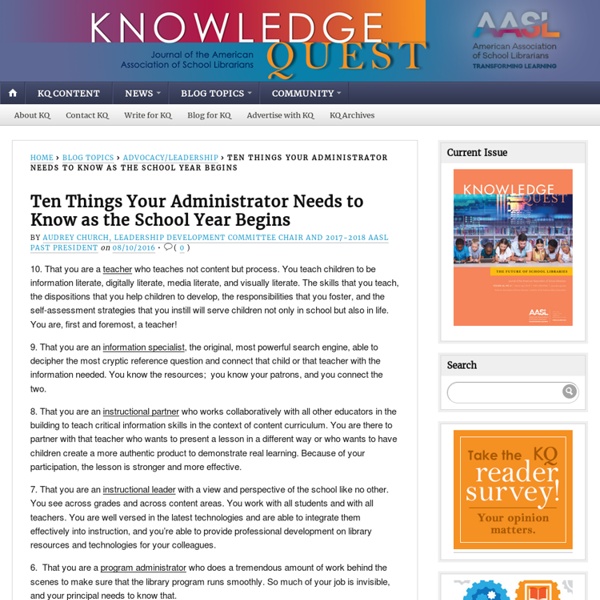Get Started - Tutorials - Proposal Writing Short Course
Introduction The subject of this short course is proposal writing. But the proposal does not stand alone. It must be part of a process of planning and of research on, outreach to, and cultivation of potential foundation and corporate donors. This process is grounded in the conviction that a partnership should develop between the nonprofit and the donor.
Six Ways To Become More Indispensable
Six Ways To Build Your PLN Using Twitter Since becoming active on Twitter over the past year and a half, I have noticed some best practices that users with a large following seem to have in common. There are many benefits to having a larger professional personal learning network (PLN). More connections equals more information coming across your Twitter feed. One of the most life changing benefits is that if you follow inspiring and innovative educators, many of them will follow you back. This always leads to powerful idea sharing and sometimes even collaboration!
VR/AR/MR, what's the difference?
Since the beginning of time, most new and emerging technology has nurtured an unhealthy attachment to acronyms, and virtual reality is no different. To help you get your head around the jargon du jour, we’ve pulled together this handy guide to what all these acronyms actually mean, and why they are not the same thing. Virtual reality (VR) The Wikipedia view: Virtual reality (VR), which can be referred to as immersive multimedia or computer-simulated reality, replicates an environment that simulates a physical presence in places in the real world or an imagined world, allowing the user to interact in that world. Foundry’s interpretation: Virtual reality is the umbrella term for all immersive experiences, which could be created using purely real-world content, purely synthetic content or a hybrid of both. This is where the industry is getting excited right now.
The Brave New Librarian
Why Brave? For several decades now we have seen some school leaders dismantling the library programs and cutting back the library staffing of their districts. During this period, some school librarians did not view the struggle as one of survival, and in many districts they have seen the cuts happen without putting up much of a fight. There are exceptions to this trend, but we have reached the point where all school librarians must view the threats to program and position as severe. We are facing what amounts to a war against libraries and information literacy. There are ignorant and cynical forces at work trying to convince the general public that library services are not needed while we have Google helping us to find the truths we need.
Giving Data Some Soul
Carolyn Foote At the 2014 Internet Librarian Conference, held in Monterey, CA (October 27–29), EBSCO user experience researcher Deirdre Costello shared the company’s efforts to delve into the research habits of teens. EBSCO researchers conducted one-on-one interviews, and they also sent video cameras to students so they could create their own research video diaries. The shared results could have been interesting, but dry. However, the EBSCO team chose to capture their results in the jargon of “Harry Potter.”
Your school library budget
This guide provides advice on what to include in your library budget, and on planning and tracking the expenditure. Contents Responsibility for your budgetDeciding on a budgeting methodLibrary budget contentBudget allocationBudget management and reviewAdditional sources of fundingBudget Proposal template Responsibility for your budget
Librarians are not born horn tooters. At least, I'm not. I know that might sound contradictory for someone who a) calls herself "library girl" and b) spends most of her time running around the countryside spreading the gospel of library. But it's true.
Big leap for school libraries
Steven Yates has a message for would-be school librarians. “If you’re coming to this because you like to read and you want to manage a collection of books, then you showed up about 30 years too late to the profession,” says Yates, a former high school librarian who teaches in the school library media certification program at the University of Alabama. The school library’s mission—matching resources with those who need them—has not changed, he says.
Five key roles for 21st-century school librarians
As the lone librarian and technology integration specialist for an entire district, regularly meeting her K-8 students on a fixed schedule, Miller does not teach alone. She models collaboration by forming instructional partnerships with educators around the world. Two Libraries, One Voice, a joint blog documenting Miller’s co-teaching experience with John Schumacher, Brook Forest Elementary School’s librarian 338 miles away in Illinois, illustrates how technology transcends geography in the new millennium. Among the highlights of her partnerships with educators in Michigan, New Hampshire, and Philadelphia, Miller featured ongoing, multi-pronged collaborations that are open to any educator wishing to include his or her students, such as Somewhat Virtual Book Club and World Read Aloud Day. If George Siemens’ statement, “The network is the learning,” is true, then Miller and her colleagues built a formidable learning platform for their students—and many, many others.
5 Ways to Advocate without Being in Your Face
Recently, a colleague and friend reminded me that sometimes the louder we get the less people listen. As librarians we know the importance of advocating for our profession. It is our responsibility to share with others what we do to help students and how this looks different from librarians of the past.
Discovery Services: Basics and Resources – Library Technology Launchpad
Why learn about discovery services? Most libraries use discovery services in addition to, or as a replacement for, their OPAC. Whether you are a technical services librarian whose job it is to administer them or a reference librarian who uses them as a major research tool, it is helpful to know how discovery services work. You need to know their features and their limitations. The Basics For this article, we will use Summon (with Serials Solutions) as an example.



